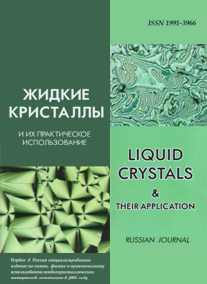|

|
Liquid Crystals and their Application
Russian Journal Zhidkie kristally i ikh prakticheskoe ispol'zovanie Жидкие кристаллы и их практическое использование |

|
|

|

|
|
|
Menu

|
|
|
|
|
Zhidk. krist. ikh prakt. ispol'z. = Liq. Cryst. and their Appl., 2011, 1, 26—35. |

|
|
Investigation of Influence of Number of Cyanobiphenoxytetramethyldisiloxypropylene Substituting Groups in Segment of Liquid Crystalline Cyclolinear Polyorganocyclohexasiloxanes on Temperatures of Their Phase Transitions
|
N. V. Chizhova, N. N. Makarova, A. A. Shaposhnikov
|
Author affiliations
A. N. Nesmeyanov Institute of Organoelement Compounds
Russian Academy of Sciences (INEOS RAS)
Russia, 119991, GSP-1, Moscow, V-334, Vavilova St. 28, INEOS
E-mail: nmakar@ineos.ac.ru
|
|
Abstract
LC polymers with 2, 4 and 6 cyanobiphenoxytetramethyldisiloxypropylene substituents in the polymer segment based on the cyclolinear polyorganocyclosiloxanes (CLPOS) with vinyl groups reactivity in silsesquioxane and siloxane fragment were synthesized. The molecular structure of polymers was determined by 1H NMR, IR spectroscopy, GPC and viscosimetry. It was established that the increasing of mesogen groups number in CLPOS rise both polymers Tg and transition temperature of LC-state by means of DSC and POM. According to the SAXS at the increase mesogen groups number in the polymer unit, the shift of the reflexes position in the area of large angels was determined. The interlayer distances for polymers with 2 and 6 mesogen groups were decreased from 40,0 to 29,4 Å respectively.
Keywords: cyclolinear polyorganocyclohexasiloxanes, LC polymers, polarized optic microscopy, DSC, phase transition
|
|
|
|
|
|




